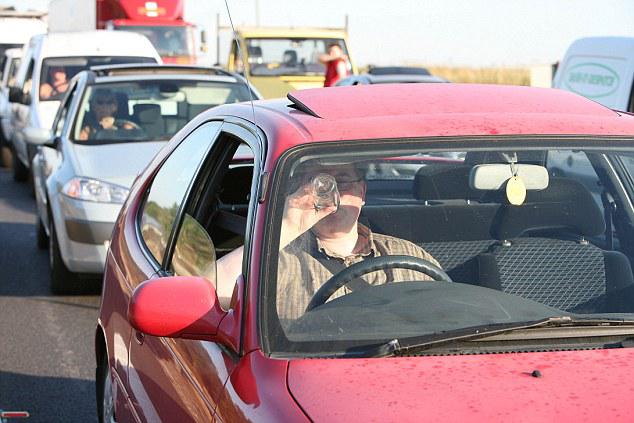
Failing to drink enough water while behind the wheel equals to being over the drink-drive limit, new research suggests.
According to a study into hydration and concentration, drivers who took in just 25ml of water per hour made the same number of mistakes on the road as those who were over the drink-drive limit. The research from Loughborough University, published in the Journal of Physiology and Behavior, said the change was evident in those who were only considered “mildly dehydrated”.
Professor Ron Maughan, Emeritus Professor of Sport and Exercise Nutrition, said the study showed that dehydration is an “unrecognized danger” for drivers. He told The Daily Telegraph: “We all blame drink driving, but we don’t usually think about the effects of other things that affect our driving skills, and one of those is not drinking and dehydration. There is no question that driving while incapable through drink or drugs increases the risk of accidents, but our findings highlight an unrecognized danger and suggest that drivers should be encouraged to make sure they are properly hydrated.” He added: “Drivers who are not properly hydrated make the same number of errors as people who are over the drink drive limit.”
The researchers said not having enough water can lead to reduced brain activity, as well as a drop in concentration, alertness and short-term memory. Tests were carried out over two days on male drivers using a driving simulator. Each volunteer used the simulator on a day when they were hydrated - which involved drinking 200ml every hour - and on a so-called dry day, when they had 25ml in the same time frame. During the normal hydration test, there were 47 driving errors. That number rose to 101 when the men were dehydrated.
The researchers also warned that driving in a hot car may lead to increased dehydration during a long journey, especially for those who do not drink to avoid stopping for a toilet break.
本时文内容由奇速英语国际教育研究院原创编写,禁止复制和任何商业用途,版权所有,侵权必究!
1.Why is dehydration an “unrecognized danger” for drivers?
A Because people neglect the effect caused by dehydration.
B Because dehydration is as harmful as drink or drugs.
C Because dehydration is harmful to one’s memory.
D Because dehydration affects people’s driving skills.
解析:选D。D 细节理解题。根据文章第3段…the effects of other things that affect our driving skills可知,口渴影响司机的驾驶技能,增加发生事故的风险,因此说口渴是一种“未被人们注意到的危险”。
2.What does Professor Ron Maughan suggest the drivers do?
A They should be concentrated when driving.
B They should drink enough water while driving.
C They should have toilet breaks while driving.
D They should make sure to drive in a proper way.
解析:选B。B 细节理解题。根据文章第3段…suggest that drivers should be encouraged to make sure they are properly hydrated可知,Ron Maughan教师建议司机开车时要进水充足,以保持灵敏的反应和清醒的头脑。
3.What is the effect of not having enough water during driving?
A Slow brain activity, drop in concentration and alertness.
B More risk of road accidents and poor driving skills.
C More driving errors and loss of short-term memory.
D Incapable of driving and increased risk in nutrition.
解析:选A。A 细节理解题。根据文章第4段not having enough water can lead to reduced brain activity, as well as a drop in concentration, alertness and short-term memory可知,如果饮水量不够,将会出现大脑反应迟钝,注意力分散,警觉性下降等问题,故选A。
4.What does the underlined word most probably mean in Paragraph Four?
A Awareness.
B Carefulness.
C Skillfulness.
D Watchfulness.
解析:选D。D 猜测词义题。根据前面的concentration,联系driving skills和driving erros可知,alertness 意为“警觉性”,故选D。
5.Which column of the newspaper does this article belong to?
A Science.
B Lifestyle.
C Culture.
D World.
解析:选A。A 推理判断题。因为本文研究了口渴对于司机驾驶技能的影响的研究,因此属于“科学”栏目。